|
|
|
Sort Order |
|
|
|
Items / Page
|
|
|
|
|
|
|
| Srl | Item |
| 1 |
ID:
189259
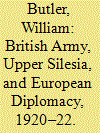

|
|
|
|
|
| Summary/Abstract |
At the end of the First World War, Britain was at the limit of its capabilities, both militarily and diplomatically. Despite large reductions in the size of its armed forces, it had an increasing number of responsibilities as a victorious power. One of these responsibilities was to ensure the success of a plebiscite in Upper Silesia. It had little desire to do this but was compelled to provide support in order to counter French influence in the region, having to do so with minimal expertise and manpower. This article explores the decision-making which occurred in relation to the British role in Upper Silesia, placing it within the wider context of British strategic and diplomatic policy in the years immediately after the First World War, while also assessing the use (or not) of British civilian and military experts on the ground. Belatedly taking a role in the region certainly helped to aid a situation which was spiralling out of control, but highlights how a short-term outlook on foreign policy and decision-making hindered British efforts to exert influence in the region and further afield.
|
|
|
|
|
|
|
|
|
|
|
|
|
|
|
|
| 2 |
ID:
130921
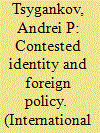

|
|
|
|
|
| Publication |
2014.
|
| Summary/Abstract |
This paper develops a framework for interpreting state international policy by treating national identity as inherently contested. Building on insights from constructivist literature, it proposes a technique for establishing the meaning of foreign policy action on several interrelated levels: state-based, society-based, and international. The paper illustrates the benefits of the approach by selecting the example of Russia's European diplomacy under President Dmitri Medvedev. By studying how officials themselves justify their policies and how these policies are then perceived in broader social and international settings, we have an opportunity to develop a rich understanding of a particular state action, as well as tentatively assess the chances of this action's success or failure.
|
|
|
|
|
|
|
|
|
|
|
|
|
|
|
|
| 3 |
ID:
084415


|
|
|
|
|
| Publication |
2008.
|
| Summary/Abstract |
This article looks at the evolution of international negotiation. The practice of negotiation between sovereigns goes back at least 4,500 years. Detailed cases are found in the royal archives of Mari from the time of the Babylonian lawgiver Hammurabi and in the el-Amarna archives of the pharaohs. Though the protocol and substance of negotiation have changed over time, there is striking continuity of structure and process. Argumentation has not changed much. The study of well-documented historical examples can therefore deepen and enrich our understanding of negotiating. In modern European history we can detect, alongside recognizable and constant features of negotiation, elements that have evolved over time. We identify four features of the international system that have impacted the evolution of international negotiation in recent centuries: technological development, international regime change, growing trust and transparency, and the enhanced, autonomous role of small powers.
|
|
|
|
|
|
|
|
|
|
|
|
|
|
|
|
| 4 |
ID:
059204
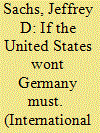

|
|
|
| 5 |
ID:
128007
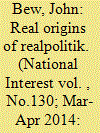

|
|
|
|
|
| Publication |
2014.
|
| Summary/Abstract |
IN 1934, a young British historian published his first book, The Italian Problem in European Diplomacy, 1847-1849. In it, he announced that a nation's foreign policy "is based upon a series of assumptions, with which statesmen have lived since their earliest years and which they regard as so axiomatic as hardly to be worth stating." It was the duty of the historian, he wrote, "to clarify these assumptions and to trace their influence upon the course of every-day policy."
|
|
|
|
|
|
|
|
|
|
|
|
|
|
|
|
| 6 |
ID:
141052
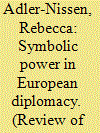

|
|
|
|
|
| Summary/Abstract |
National diplomacy is challenged by the rise of non-state actors from transnational companies to non-governmental organisations. In trying to explain these challenges, scholars tend to either focus on a specific new actor or argue that states will remain the dominant diplomatic players. This article develops an alternative Bourdieu-inspired framework addressing symbolic power. It conceptualises diplomacy in terms of a social field with agents (field incumbents and newcomers alike) who co-construct and reproduce the field by struggling for dominant positions. The framework is applied to the EU's new diplomatic service (the European External Action Service, EEAS), which is one of the most important foreign policy inventions in Europe to date. I show that the EEAS does not challenge national diplomacy in a material sense – but at a symbolic level. The EEAS questions the state's meta-capital, that is, its monopoly of symbolic power and this explains the counter-strategies adopted by national foreign services. The struggles to define the ‘genuine’ diplomat reveal a rupture in the European diplomatic field, pointing towards a transformation of European statehood and the emergence of a hybrid form of diplomacy. A focus on symbolic power opens up new avenues for the study of transformations of authority in world politics.
|
|
|
|
|
|
|
|
|
|
|
|
|
|
|
|
|
|
|
|
|